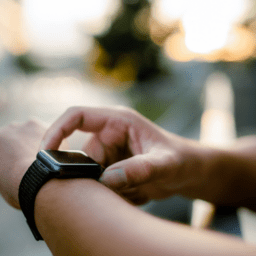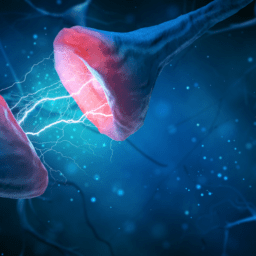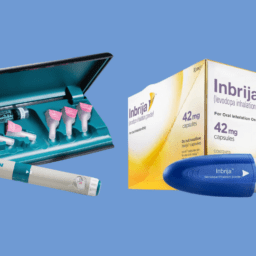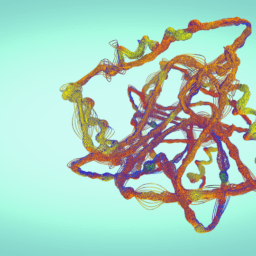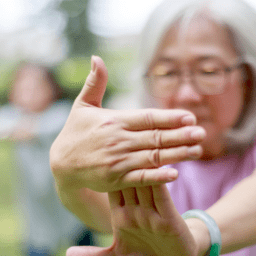Irisin, exercise, and Parkinson’s. Detecting Parkinson’s in less than three minutes. Toe-tapping for risk assessment. The latest on the National Plan to End Parkinson’s Act. Here’s what’s new in the world of Parkinson’s this month.
PARKINSON’S ARTICLES
- Utilizing cotton swabs, paper spray ionization mass spectrometry, and ion mobility separation, researchers from The University of Manchester have developed a new method to detect Parkinson’s in a clinic setting in as little as three minutes. They were assisted by Joy Milne, whose late husband lived with Parkinson’s and who discovered she could detect Parkinson’s in people by their distinct body odor. The research was published in the Journal of the American Chemical Society.
- Researchers at Texas A&M University have developed a toe-tapping test that uses data collected from “smart shoe” insoles to assess the fall risk of a person with Parkinson’s.
- Findings from a mouse model of Parkinson’s indicate that the hormone irisin (which is released from muscles and other tissues into the bloodstream during exercise) may prevent the accumulation of toxic alpha-synuclein, help preserve neurons, and minimize motor symptoms. The study was published in PNAS.
- A study published in Science Translational Medicine explains how the basal ganglia (a network of nuclei responsible for the body’s motor control) control the vigor of leg movements. The findings highlight the connection between dysfunction of the basal ganglia and freezing of gait in Parkinson’s and may help inform future therapies to improve the mobility of people with Parkinson’s.
- Using the “Sendai Reprogramming” technique, an international team of researchers identified for the first time several neural processes that many different types of Parkinson’s have in common. The research was published in njp Parkinson’s Disease.
- The Parkinson & Movement Disorder (PMD) Alliance, in partnership with Neurocrine Biosciences, recently shared findings from their survey about the impacts of OFF time on the Parkinson’s community. Among the 113 people with Parkinson’s who completed the survey, 86% said they experience OFF times daily, and a majority said it has a significant impact on their daily activities. Data also showed that many people with Parkinson’s and their care partners believe that OFF times are simply part of Parkinson’s and that many may not be aware of adjunctive treatment options that can minimize OFF times.
- A small study published in BMC Research Notes suggests that the prevalence of blood vessel dysfunction among people with Parkinson’s is not significantly different than rates among the general population.
- Findings also showed that smoking and taking dopamine agonists among people with Parkinson’s were associated with poorer blood vessel function.
- However, the use of antipsychotic medications was found to be substantially more common among people with Parkinson’s than in the general population, according to a study based on national data in Finland.
- The use of antipsychotic drugs was higher in people with Parkinson’s both before and after diagnosis, with the most significant differences seen about five years after diagnosis.
- A letter published in Movement Disorders explains how Parkinson’s and diabetes mellitus (Type 2 diabetes) comorbidities are associated with more severe neuroaxonal damage.
- A study published in Trends in Neurosciences explains how nasal bacterial influences olfactory processing and neurodegeneration, particularly in Parkinson’s.
- Using data from the Parkinson’s Progression Markers Initiative (PPMI), Cohen Veterans Bioscience found that wearables data combined with a specific artificial intelligence algorithm can effectively identify people with Parkinson’s. The study was published in the journal Sensors.
- Findings from a nested case-control study published in PLOS Medicine showed that a hospital-treated infection five or more years before diagnosis was associated with a 4% higher risk of Parkinson’s. Similar risks were seen for bacterial, viral, and other infections and for different sites of infection.
- MIT researchers have developed an at-home device that can monitor a person’s movement and gait speed without people having to wear anything. The data, collected using radio signals, allows the person’s physician to determine the severity of their Parkinson’s, its progression, and the person’s response to medication.
- A study by researchers at Weill Cornell Medicine and published in Nature Communications suggests that clumps of alpha-synuclein spread in the brains of people with Parkinson’s through a cellular waste-ejection process called lysosomal exocytosis.
- In Neurology, an international team of researchers explains how a test that combines two current laboratory techniques—the enzyme-linked immunosorbent assay (ELISA) and the seed amplification assay (SAA)—to measure alpha-synuclein aggregates in a person’s cerebrospinal fluid (CSF) is better able to detect Parkinson’s than each test on its own. Findings suggest that the new test may help clinicians monitor Parkinson’s progression and treatment response.
-
The National Plan to End Parkinson’s was introduced in the U.S. Senate by Senator Shelly Moore Capito (R-WV), who introduced S.4851 with bipartisan support from cosponsor Christopher Murphy (D-CT). The bill directs the Secretary of Health and Human Services to carry out a national project to prevent and cure Parkinson’s, known as the National Parkinson’s Project.
-
The US Environmental Protection Agency (EPA) has asked the Ninth Circuit to allow it to reconsider its earlier decision to reapprove the use of paraquat, an herbicide linked to Parkinson’s.
-
For their 2022-2023 funding year, the American Parkinson Disease Association (APDA) has awarded $2.35 million to support research on an array of topics, including the molecular underpinnings of anxiety in Parkinson’s, the role of DNA damage in genetic mutations in Parkinson’s, augmented reality therapy to treat freezing of gait, and more.
- New grant funding from The Michael J. Fox Foundation (MJFF) will pave the way for enhanced clinical studies of AC Immune’s alpha-synuclein PET tracer program. If successful, the program could deliver the world’s first imaging agent capable of accurately detecting and monitoring the progression of Parkinson’s.
PARKINSON’S treatments and THERAPIES
- Researchers from Sunnybrook Health Sciences Centre and University Health Network (UHN) demonstrated for the first time that focused ultrasound technology can be used to safely deliver treatments (in this case, the enzyme glucocerebrosidase) directly into targeted brain regions (in this case, the putamen) in people with Parkinson’s. “It is still very early in the research, but with our first-in-the-world study findings, we are making much-needed progress in developing innovative treatments for people with Parkinson’s,” a co-principal investigator said. The study was published in Movement Disorders.
- A systematic review and meta-analysis published in BMC Neurology found that treatment with the dopamine agonist Mirapex (a branded pramipexole medication) improved quality of life for people with Parkinson’s regardless of the stage of their Parkinson’s or how long they had been receiving treatment.
- Also showing potential to improve quality of life in people with Parkinson’s are multi-strain probiotics. A study published in Parkinsonism and Related Disorders found that 12 weeks of probiotic treatment helped minimize constipation and improve quality of life measures in people with Parkinson’s.
- A study shared at the International Congress of Parkinson’s Disease and Movement Disorders suggests that sport climbing improves posture in people with mild to moderate Parkinson’s.
- Amneal Pharmaceuticals has filed for FDA approval of its Parkinson’s drug candidate IPX203, an oral, extended-release formulation of carbidopa/levodopa.
- Also at the event, Pharma Two B presented positive efficacy and safety data of the drug candidate P2B001 from their Phase 3 Trial. P2B001 is a once-daily, fixed-dose combination of extended-release formulations of low doses of pramipexole and rasagiline. Data suggests that the medication may significantly improve motor symptoms and daily function in people with Parkinson’s while also reducing side effects often associated with dopamine agonists, such as daytime sleepiness, orthostatic hypotension, and hallucinations.
- At the same event, PharmaTher shared data from a Phase 1/2 clinical study that found ketamine to be safe and well-tolerated in 100% of people with Parkinson’s, which led to a reduction in levodopa-induced dyskinesias.
- Another promising Parkinson’s therapy highlighted at the International Congress is trans-auricular vagus nerve stimulation (taVNS), which research recently showed to be well-tolerated among people with Parkinson’s and which may improve motor function.
- Findings from two studies published together in the New England Journal of Medicine indicate that compared with placebo, treatment with prasinezumab has no meaningful impact on global or imaging measures of Parkinson’s progression.
- Thanks to a new agreement with Neuron23 Inc., QIAGEN will work to develop a clinical trial test with the ability to detect a combination of biomarkers (previously discovered by Neuron23) that can predict the responsiveness of Parkinson’s to a LRRK2 inhibitor.
- A meta-analysis that included 18 randomized controlled trials showed that people with Parkinson’s who participated in resistance training had significantly greater improvement in motor impairment, muscle strength, mobility, and balance than people who underwent passive or placebo interventions. However, there was no significant difference between people who did resistance training and those who participated in other active physical interventions.
- A review study of clinical trial data found that the epilepsy medication Zonisamide may reduce Parkinson’s motor symptoms. The research was published in BioMed Research International.
- Innervace, a biotech company formed with support from the Penn Center for Innovation, has raised nearly $40 million to support its novel regenerative cell therapy platform for Parkinson’s.
PARKINSON’S LIVING WELL STORIES
- Two high school students in Virginia have developed AutoTrem, an automatic walker that helps people with Parkinson’s improve their mobility.
- Before this month’s Superwalk fundraiser, which she began in her community, Laura Wilson shares “a love letter” she wrote years ago from Parkinson’s to her newly diagnosed self.
- A team of 12 runners with Parkinson’s will journey 208 miles through the Blue Ridge Mountains to raise Parkinson’s awareness.
- Chicago Bulls player Ayo Dosunmu recently participated in the annual Race to Impact event, supporting his grandfather who was diagnosed with Parkinson’s in 2011.
PARKINSON’S SURVEYS, CLINICAL TRIALS, and volunteer opportunities
- Do you have early-stage Parkinson’s? The Orchestra Study is a clinical research study to evaluate the use of an investigational medication called UCB0599 in men and women with early-stage Parkinson’s. You can learn more and see if you qualify here.
- PD GENEration – The Parkinson’s Foundation has announced a major expansion of its national study to make genetic testing and counseling more available for people with Parkinson’s. The study (NCT04057794) hopes to enroll 15,000 people in all 50 US states, Puerto Rico, and the Dominican Republic. Details are available here. For questions about enrollment, email genetics@parkinson.org.
- Parkinson’s Progression Markers Initiative – In an expanded study, the Parkinson’s Progression Markers Initiative (PPMI) is currently working to enroll up to 100,000 people with and without Parkinson’s. The study team is especially seeking to enroll people diagnosed with Parkinson’s in the past two years and who are not yet on treatment, as well as people 60 and older who aren’t living with Parkinson’s but have a risk factor for it (such as a close relative with Parkinson’s, a known Parkinson’s-associated mutation, and/or REM sleep behavior disorder). The observational study is also enrolling people with no known connection to Parkinson’s to serve as a control group. Learn more here.
- TOPAZ (Trial of Parkinson’s and Zoledronic Acid) – Caroline Tanner, MD, PhD, is recruiting participants for a new remote clinical trial led by a team of Parkinson’s experts at UCSF in partnership with researchers from across the country. The study aims to help people with Parkinson’s or parkinsonism maintain their independence by reducing the risk of hip fractures. The study will test if zoledronate, an FDA-approved medication for osteoporosis, can prevent fractures in people with Parkinson’s, whether or not they have osteoporosis. To learn more, visit the study website at TOPAZstudy.org, email TOPAZ@ucsf.edu, or call (415) 317-5748.
- Join Google and LSVT in Project Euphonia – LSVT Global has partnered with Google on an exciting research project called Project Euphonia to help improve automatic speech recognition software for people with speech disorders. These disorders may make using devices like Google Home, The Nest, and other Smart devices, Siri, Alexa, or speech-to-text frustrating. To do this, LSVT Global needs samples of disordered speech to train the system. You are encouraged to enroll if you’ve been diagnosed with Parkinson’s, PSP, MSA, or CBD with mild, moderate, or severe speech disorders. Participation is easy, can be done from your own home, and can earn you a $60 gift card! Learn more here.
- G2019S LRRK2 Parkinson’s: Increasing Awareness and Genetic Testing Program – This program aims to support the development of precision medicine intended to treat people with genetic forms of Parkinson’s. Up to 15% of cases of Parkinson’s disease have an underlying genetic cause, yet many people have never had genetic testing. This research program will be very important in supporting the future development of a new oral precision medicine treatment for one of the most common genetic forms of Parkinson’s, aimed at slowing its progression. To learn more, visit geneticpd.com.
- A PD Avengers research group is undertaking a new project called Sparks of Experience, designed to be more systematic about collecting and considering the experiences and ideas that come from the curious minds of people living with Parkinson’s. “In the past, these sometimes quirky ideas inspired by lived experience have turned into significant new directions for research. It could be said we are trying to capture serendipity,” the team says. To learn more and get involved, see the flyer here.
- Game-based Exercise Project – Researchers at the University of Auckland are investigating how games can be used as potential rehabilitation systems. This project aims to develop suitable game-based exercise experiences to help people living with Parkinson’s. If you are 45 or older, and living with a chronic condition such as Parkinson’s, and/or are experiencing age-related health conditions, you are invited to participate in a survey that will help the researchers to understand the community’s interests in games and gameplay in the context of exercise and rehabilitation. To learn more and take the 15-minute survey, see the flyer here.
- SPARX3 – A Phase 3 Clinical Trial about Exercise and Parkinson’s – This research team is currently seeking volunteers to participate in a clinical trial about the effects of aerobic exercise on people with Parkinson’s. Learn more and see if you qualify here. For more details, contact Katherine Balfany at SPARX3@ucdenver.edu.
- PAIRing Up – If you are a person with Parkinson’s or a care partner to someone with Parkinson’s, you are invited to participate in an online survey to address neuropsychiatric (cognition, depression, anxiety) concerns in Parkinson’s. The survey aims to learn about the needs and priorities for clinical care, education, support, and research related to neuropsychiatric symptoms. To learn more and participate, click here to download the flyer.
- A multidisciplinary research team in the UK is investigating how to best use music to help people with Parkinson’s manage symptoms related to movement and mood. This includes research about music for dancing and is the first study to incorporate the new Dance Sophistication Index for people with Parkinson’s. To learn more and take a 30-minute survey, click here.
- The University of Oulu and collaborators from Aalborg University, Fraunhofer University, the University of Manchester, the University of Glasgow, the University of Lisbon, and the University of Melbourne, are conducting a survey for people with Parkinson’s and Parkinson’s care partners about self-care. Complete the survey here to share your self-care strategies and techniques. You can also review ideas submitted by others and add them to your own self-care toolbox.
- Home-based Exercise and Cognitive Behavior Therapy – University of Alabama in Huntsville
- Speech and Telemedicine Study – The Purdue Motor Speech Lab
- Parkinson’s and Service Dogs – University of Groningen, Netherlands
- Neurology Study Interest Registry – University of Rochester
- Park Test – University of Rochester
For more of what’s new in Parkinson’s news, check out our full series here.
WANT MORE PRACTICAL ARTICLES LIKE THIS?
You can find much more in our Every Victory Counts® manual. It’s packed with up-to-date information about everything Parkinson’s. Request your free copy of the Every Victory Counts manual by clicking the button below.
Thank you to our 2022 Peak Partners, Amneal, Kyowa Kirin, and Sunovion, as well as our Every Victory Counts Gold Sponsor AbbVie Grants, Silver Sponsor Lundbeck, and Bronze Sponsors Supernus and Theravance for helping us provide the Every Victory Counts manual to our community for free.







